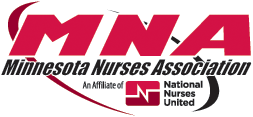Members of the Minnesota Nurses Association gathered in St. Paul Oct. 13 – 16 to set the wheels in motion of another eventful year ahead. Gathering for the 108th time in the history of the organization, nurses made noteworthy operational changes; attended provocative education sessions; shared experiences during networking opportunities and took time to honor the achievements of colleagues who have made significant contributions to nursing and MNA.
“Our journey ahead will result in the advancement of our nursing profession through the solidarity of bedside nurses,” declared MNA President Linda Hamilton as she welcomed the elected leaders during opening ceremonies of the House of Delegates.
Opening Speeches Inspire
President Hamilton, along with National Nurses Association Co-Presidents Karen Higgins and Jean Ross brought delegates up to date on state, national and global efforts by nurses to address health care and economic injustice issues. “Nurses must stand up and be heard, because silence implies we accept the unacceptable,” said Hamilton. She set out a clear challenge to MNA members to consider running for elected office. “We need you,” urged Hamilton. Higgins relayed her admiration for the nurses of Minnesota and credited us for fueling the energy that is spreading across the nation. “Organizing momentum is gaining throughout the country, as nurses from Texas, Florida and Missouri join our national union. NNU is also on the frontline of pushing for additional research providing more evidence of the correlation between nurse staffing and patient outcomes. “We know the data will help us prove that limiting patients is not only safer, but saves money as well,” said Higgins. Jean Ross painted the global picture, saying “We have an international coalition of nurses connected in purpose.” Referring to the newly-formed Global Nurses United, Ross informed delegates that unions from 14 countries have agreed to work together to stop the harmful effects of austerity measures, privatization and cuts in health care services.
Education Hot Topics
“Everybody’s a storyteller,” according to John Capecci, author and communications coach who encouraged nurses to use storytelling to be better patient advocates. According to Capecci, the five qualities of a good story are: 1) focused; 2) positively charged; 3) crafted; 4) framed and 5) practiced.
Nurses can be effective at telling their stories and affecting changed about patient care if they can explain how the world could be better using the positive message of change even if it’s changing from the sad story they know. He said stories can be effective change agents even if they’re just stories told at a party.
Capecci also advises nurses should know what they want their audience members to do by making goals for each audience and focusing the story to achieve those goals. Nurses practiced their story telling by listing why they want safe patient care in exactly six words. Compelling examples such as “I want you home alive,” and “It’s my responsibility to care,” immediately popped out of nurses’ mouths. Capecci said, as a patient, he was moved to want to help make hospital care better for patients and nurses.
Attendees had the opportunity to get an up-close look at the impact the Affordable Care Act (ACA) might have on health care, the hospital industry and the nursing profession. Heidi Hoechst of NNU described key elements of the Act, and reminded nurses how often the “patient” part has been ignored in the media coverage.
Hoechst pointed out the challenges we already face as different insurance providers choose to define the words “quality” and “affordable.”
Meanwhile, companies are using the ACA as an excuse to cut employee hours. Hospitals, specifically, are not only cutting staff and reducing hospital stays, but are advancing an agenda of de-skilling and the automation of the nursing profession, all in the name of financial difficulty despite soaring profits for hospitals.
Heidi ended on a note that as with any law, changes may be required, but we see this as moving one step closer to true universal coverage.
Rene Cronquist, Director of Practice and Policy at the Minnesota Board of Nursing led a session regarding changes to the Nurse Practice Act which became effective Aug. 1, 2013. Working together with MNA, the Board implemented new policies that help clarify and define role differentiation between LPNs and RNs.
Awards Ceremonies Celebrate Scholarship, Research and Achievement
The stars among us include nursing students and nursing researches who were awarded over $101,000 in scholarships and grants by the Minnesota Nurses Association and the following award winners:
- Rep. Joe Atkins – Political Official Award
- Kava Zabawa and Coral Bastien – Paul and Sheila Wellstone Social Justice Award
- Margaret Dornfeld – Creative Nursing Award
- Joe Howard – Sarah Tarleton Colvin Political Activist Award
- Maxine Patterson – Nurse Educator Award
- Elizabeth Voss – Nurse Researcher Award
- Mary Gag – Mentorship in Nursing Award
- Richard Ames – Distinguished Service Award
- Mary Kirsling – Audrey Logsdon/Geraldine Wedel Economic and General Welfare Award
- Randi Owens – Ruth L. Hass Excellence in Practice Award
- Cynthia Petty – Elizabeth Shogren Health and Safety Award
- Bernadine (Bunny) Engeldorf – President’s Award


